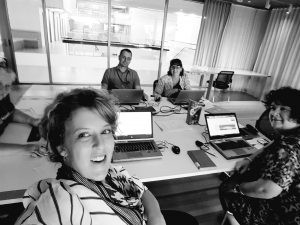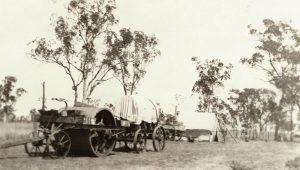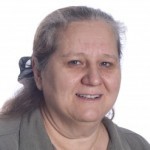Let’s get our regions on Wikipedia
By administrator | 23 January 2017

SLQ staff getting Wiki with it during #1lib1ref coffee hour.
Jacinta Sutton from State Library's Discovery Services team recently sat down with Wikipedian Kerry Raymond to talk about her work with Wikipedia and their #1lib1ref campaign.
First things first, what’s a Wikipedian? “Anyone who edits a Wikipedia article is a Wikipedian”, says Kerry. By that standard, Kerry is a Wikipedian extraordinaire. A retired computer science professor with a mind like a steel trap, Kerry created a Wikipedia account in 2005. Since retiring in 2012 her contributions to the Wikipedia research ecosystem have grown to over 80,000 edits to the English Wikipedia and over 30,000 to Wikimedia Commons.
Kerry was SLQ’s QANZAC 100 WW1 Wikipedian in Residence in 2016. Her role was assisting staff and members of the public to learn how to edit Wikipedia and to contribute content in relation to the home-front experience of Queenslanders during WW1, drawing on the material in SLQ’s collection as sources. The Wikipedian in Residence role was designed to align with the Wikimedia Foundation's strategic plan to "improve quality ... via partnerships with universities, cultural institutions and other groups who align with our mission".
Kerry’s Residency is now completed, however she still acts as a liaison to SLQ and continues to edit Wikipedia, pursuing her interests in Queensland’s history, geography and biography. What is it about editing Wikipedia that Kerry enjoys? “I learn new things every day, in particular how we find one thing is so connected to another. It’s rare to find one topic that doesn’t have connections to other articles. History isn’t a set of independent stories but is interconnected. Wikipedia helps you reflect that in a way that history books don’t.”
Kerry’s approach to editing content is source driven, by what information she finds through sources including the Queensland Heritage Register, the Queensland Place Names database, census records, Trove digitised newspapers, Queensland Family History Society’s schools database, State School annual reports, Queensland Globe (an interactive online tool that can be opened inside the Google Earth application) and the John Oxley Library. “I might come across an interesting obituary and go from there”, said Kerry, which will then lead to the creation of a new page that represents the story of that person’s legacy.

The Moonie Highway was the impetus for a Wikipedia page on the small town of Kumbarilla. Image: John Oxley Library, State Library of Queensland.
Kerry is also motivated by red links (An internal wikilink that leads to a page that does not exist) and will create articles for red links that are in high demand. Kerry has also created a page for just about ‘every moderately populated town in Queensland’, including the small town of Kumbarilla, in the Western Downs region.
What started as a red link for the Moonie Highway, turned into a Wikipedia page for Kumbarilla, with a population of 241. Using Queensland Globe, Kerry found and added to Wikipedia that almost all of Kumbarilla is subject to a petroleum lease for coal seam gas, and it is also one of the place names listed in the first version of the song ‘I’ve Been Everywhere’ (in the first verse, ‘..Muckadilla, Wallumbilla, Boggabilla, Kumbarilla..’).
Kerry is keen to help Queenslanders in regional areas develop a presence on Wikipedia. ‘Locals can contribute unique knowledge of their area to Wikipedia without the limitation of physical pages, they can tell the story at the length it needs to be told,’ Kerry said. An easy place to start is by contributing photos of your town, for Queensland-related articles needing a photograph.
I asked Kerry her thoughts on the relationship between libraries and Wikipedia, outlined here in the recently released IFLA White Paper: Opportunities for Public Libraries and Wikipedia.
“Libraries are our traditional authority when it comes to research and knowledge, so I’m excited about Wikipedia engaging with libraries to make it more accurate. It can be as easy as reference librarians, having spent time researching information to answer patron queries, then asking themselves, ‘is this something that could be added to Wikipedia?’”
The skillset of the librarian is perfectly suited to Wiki editing, Wikipedia launched their #1lib1ref campaign on 15th January, coinciding with their 16th birthday. Running until 3rd February, Wikipedia asks us to imagine a world where every librarian added one more citation to Wikipedia, estimating that if each librarian on the planet spent 15 minutes adding a citation, then the English Wikipedia's backlog of 350,000 citations would be cleared!

Kerry Raymond ... I’m excited about Wikipedia engaging with libraries to make it more accurate.
As the host of the #1lib1ref editing sessions being held at SLQ, Kerry is thrilled by the SLQ staff enthusiasm and is ‘delighted that the State Librarian has personally initiated SLQ’s participation in #1lib1ref. I hope the other libraries in Australia will be able to step up and match your commitment’.
There are more Wikipedia articles about Queensland than any other state or territory and with your help we can continue to build the story of Queensland. Kerry is happy to hear from anyone who is interested in learning more about contributing to Wikipedia and there may even be an experienced Wikipedian in your area. Kerry will be less contactable during February as she will be overseas but she would welcome your email at this address kerry.raymond@gmail.com.
Follow Jacinta on Twitter @jjsttn for more adventures in library land.
Comments
Your email address will not be published.
We welcome relevant, respectful comments.